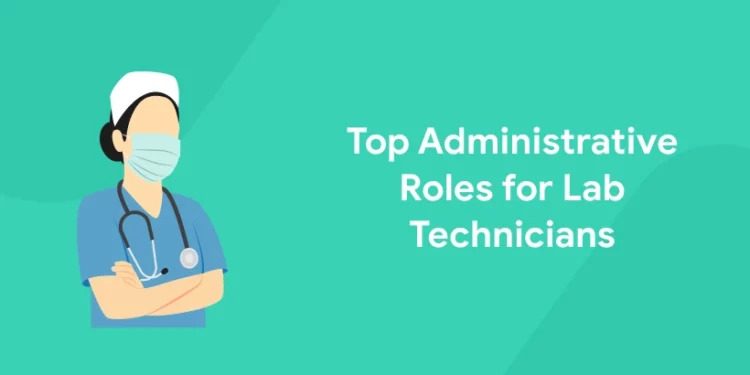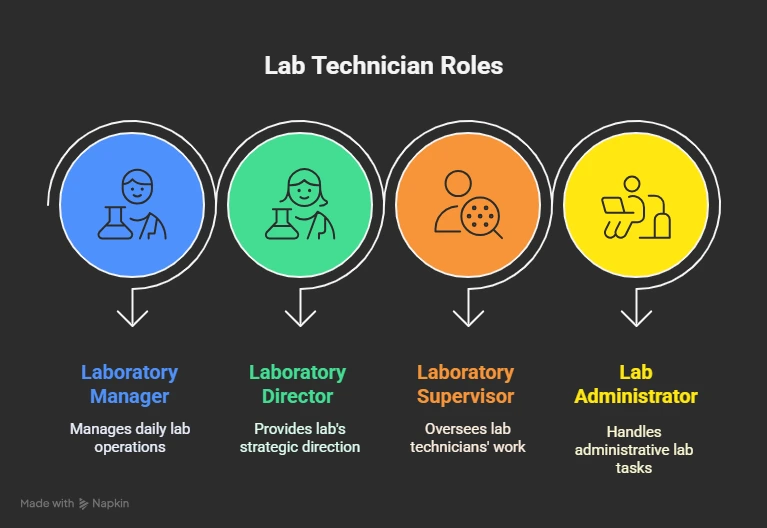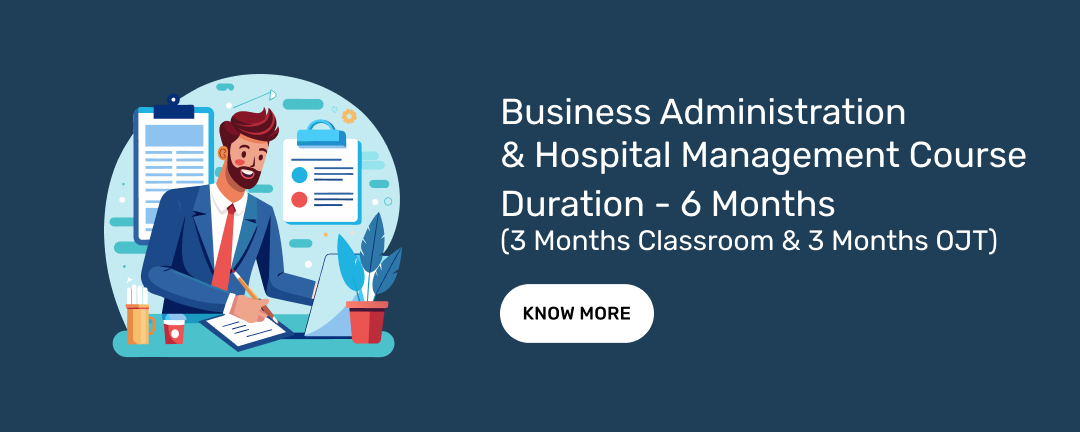Table of Contents
Lab technicians are a very important part of various industries. Especially in the healthcare industry, where they help provide accurate diagnoses and hence effective treatment plans. They ensure the smooth running of labs, maintenance of lab equipment and supplies and setting up routine experiments. They also collect, sort, label and enter patient data. Making up general chemical solutions for the lab also comes under their work profile. However, as they gain more experience, a lab technician can take up more administrative roles. Some of the top administrative roles for lab technicians are discussed in this blog.
Top Administrative Roles for Lab Technicians: Introduction
A lab technician, like all other jobs, cannot remain stagnant in the clinical field for years. Once they have a good few years of work in their resume, they move to higher-paying administrative roles. In the case of such a transition, the industry you are working in is the same i.e., the healthcare. In that case, some skills you already had as a lab technician will come to use. But taking up admin roles requires a new skill set that you might have never had. So, acquiring such skills is an essential part of having better career growth as a lab technician. So, let us take a look at the top administrative roles for lab technicians that are very popular among lab professionals and lab interns/students.
Skills Lab Technicians Bring to Admin Roles
As we discussed above, we already bring the skillset of a lab technician to the new role. All the skills of a lab technician might not be useful for an admin role. But some of those skills can help you get ahead in admin roles. Lab technicians have technical expertise, precision, and organizational skills that are very important parts of the skillset for admin jobs. Their hands-on experience in managing operations, ensuring compliance, and supporting strategic decisions in labs and healthcare settings shape them as excellent candidates for administrative positions.
Strong Understanding of Laboratory Procedures
A lab technician is instructed and trained to follow Standard Operating Procedures (SOPs). This is done to ensure accuracy and consistency. Attention to protocol in this manner supports administrative roles because in such positions maintaining standards and policies is key. These include:
- Detailed knowledge of lab workflows and regulations
- Strict adherence to safety and procedural guidelines
- Ability to train staff on standard protocols
Technical and Equipment Proficiency
The roles of administrators in healthcare settings often involve equipment management, procurement, and budgeting. So already having hands-on experience working with lab equipment is a big plus point for lab technicians wishing to go into admin roles. Listed below are some useful skills possessed by lab technicians in this aspect.
- Knowledge of how to operate and maintain lab equipment like a centrifuge, microscope etc.
- Troubleshooting technical issues
- Keeping track of maintenance logs and calibration schedules
Data Management and Analysis
Lab technicians handle and interpret data daily. This gives them an analytical edge that is well-needed in admin roles. The data management and analytical skills of a lab technician can help them in admin positions when it comes to the following things.
- Assurance
- Reporting
- Compliance tracking
Some of the relevant skills related to data a lab technician possesses to work efficiently in administrative roles are listed below.
- Accurate documentation and record-keeping
- Data entry and management using lab software
- Analyzing results for patterns and abnormalities
- Preparing reports and summaries for supervisors
Inventory and Resource Coordination
Lab is a workplace that is constantly in need of replenishing the needed resources. Good inventory management skills are essential for keeping a lab stocked and organized appropriately. Admins’ roles give great importance to logistics and procurement. So, the skills mentioned below are helpful if you are aiming to work in admin positions.
- Monitoring supply levels and ordering materials
- Organizing and labelling materials for easy access
- Maintaining records of usage and stock
Collaboration and Communication
Lab technician is a role in which you must communicate and collaborate with a variety of healthcare professionals like physicians, researchers, and team members. This aspect of their job profile prepares them well for positions that require good leadership or coordination skills. Some experiences lab techs have that are essential for admin roles in this aspect are listed below.
- Supporting clinical trials and interdisciplinary teams
- Clear communication of test results and procedures
- Sharing insights with colleagues for research continuity
Commitment to Safety and Compliance
Good knowledge of safety protocols is essential for administrative roles. A lab technician is someone who already understands the importance of compliance and risk management very well. Some skills they have in this aspect are:
- Knowledge of handling and disposing of hazardous materials
- Familiarity with regulatory standards and documentation
- Reporting safety concerns and ensuring team compliance
Patient Interaction and Service Orientation
One of the key responsibilities of a lab tech is sample collection from patients. This is something that has to be done with professionalism and compassion. These skills are essential when it comes to admin roles too. These skills include:
- Collecting specimens with care and empathy
- Communicating clearly with healthcare providers
- Maintaining confidentiality and privacy (e.g., HIPAA compliance)
Top Administrative Roles for Lab Technicians
As their career graph grows, lab technicians can move to admin roles. They already have the technical expertise and organisational skills necessary. All they have to do is continue their education and get more certifications and hence skills essential for admin roles. Some of the top administrative roles for lab technicians are listed below. Read on to learn more about the job profile and responsibilities of admin roles in the healthcare sector that are suitable for lab technicians.
Laboratory Manager
Laboratory manager is another key admin role required in not only medical lab settings but also R&D labs, forensic labs and academic settings. A laboratory manager must combine strong admin skills with their technical skills to manage the technicians, ensure safety and compliance etc. The skills and qualifications required by a laboratory manager are given in the table below.
| Qualification / Skill | Description |
| Bachelor’s Degree | Degree in biology, chemistry, biochemistry, or a related field |
| Laboratory Experience | Minimum of 3 years working in or managing a laboratory |
| Managerial Skills | Strong ability to lead, mentor, and discipline lab staff |
| Multitasking Ability | Efficient at handling multiple responsibilities simultaneously |
| Health & Safety Expertise | Deep understanding of safety protocols for lab environments |
| Technical Proficiency | Experience with lab software and equipment |
| Security & Data Integrity | Ability to manage sensitive lab documents and ensure data confidentiality |
The roles and responsibilities of a laboratory manager are given below.
| Responsibility | Description |
| Staff Scheduling | Organizing lab shifts and ensuring proper allocation of time for equipment and testing |
| Supply Management | Reordering lab supplies and preparing procurement lists |
| Sample Disposal | Ensuring safe and compliant disposal of biological or chemical samples |
| Training & Mentoring Staff | Instructing lab technicians on equipment usage and safety procedures |
| Health & Safety Compliance | Enforcing lab safety standards and ensuring staff follow correct protocols |
| Security Supervision | Managing sensitive documents and securing data, especially in government or clinical labs |
| Software & Equipment Maintenance | Overseeing the use and functionality of lab management software and scientific instruments |
Laboratory Director
Another admin role a lab technician can take up as their career grows is that of a laboratory director.
Laboratory Director Skills
The roles and responsibilities of a laboratory director are given below.
| Responsibility Area | Description |
| Operational Supervision | · Oversees daily lab operations
· ensuring compliance with regulations (CLIA, CAP, ISO) · Maintains lab efficiency and accountability |
| Personnel Management | · Hires, trains, and evaluates lab staff
· Ensures ongoing education and staff competency across all levels. |
| Safety and Facility Management | · Maintains biosafety standards
· Maintains chemical hygiene · Ensures regular safety training for all personnel · Maintains ergonomic workspace design |
| Test Procedures and Quality | · Selects and validates testing methods
· Oversees quality control measures · Participates in proficiency testing to ensure accurate results |
| Education and Clinical Support | · Acts as a liaison to clinicians
· Provides guidance on test interpretation · Supports institutional training initiatives |
| Communication and Compliance | · Ensures transparent communication with healthcare providers, administrators, and regulatory bodies
· Maintains up-to-date documentation |
| Strategic and Financial Planning | · Develops lab budgets
· allocates resources · plans for future lab expansion and technology upgrades |
Laboratory Director Roles
There are some skills you should have to become a laboratory director. Listed below are some of roles of a lab director.
| Category | Details |
| Educational Qualifications | · PhD in a relevant scientific discipline
· Master’s degree (minimum requirement) |
| Professional Experience | · Minimum 5 years in a lab setting
· Extensive management experience |
| Regulatory and Compliance | · In-depth knowledge of lab safety standards
· Strong background in regulatory compliance |
| Research and Development | · Demonstrated experience in R&D
· Ability to analyze complex scientific data |
| Leadership and Management Skills | · Proven team leadership
· Strong project and organizational management |
| Technical Knowledge | · Familiarity with advanced lab equipment and techniques
· Proficiency in LIS/software |
| Soft Skills | · Excellent communication and interpersonal skills
· Decision-making and problem-solving |
| Attention to Detail | · Commitment to accuracy
· Strong attention to procedural detail |
Laboratory Supervisor
Laboratory Supervisors are essential in the smooth functioning of a lab. These are the professionals who ensure that a lab operates efficiently, safely, and accurately.
Laboratory Supervisors Skills
The skills and qualifications required by a laboratory supervisor are listed below.
| Skill / Qualification | Description |
| Education Requirements | Bachelor’s degree in clinical laboratory science, medical technology, or a related life science field |
| Preferred Advanced Education | Master’s degree in lab science, management, or an MBA (optional but preferred) |
| Licensure & Certification | Licensure required in most states; certification (e.g., ASCP) preferred |
| Experience Requirement | Minimum 3–5 years in a clinical lab; supervisory experience often gained as a lead technologist |
| Leadership Skills | Ability to manage staff, assign tasks, resolve conflicts, and ensure team productivity |
| Detail-Oriented Thinking | Ensures the accuracy and reliability of lab test results |
| Problem-Solving Skills | Troubleshoot equipment and testing issues quickly and effectively |
| Communication Skills | Interacts with physicians, nurses, and lab personnel to interpret and convey test results |
| Time Management | Balances test schedules, staffing, and reporting deadlines |
| Technical and Regulatory Knowledge | Familiar with lab procedures, safety protocols (CLIA, OSHA), and quality assurance programs |
| IT and Data Management Skills | Proficient in lab information systems (LIS) and data reporting tools |
Laboratory Supervisors Roles
Like other lab admin skills, the lab supervisor also has some roles and responsibilities. Some of the responsibilities and duties that a person holding the position of lab supervisor has to do are listed below.
| Responsibility | Description |
| Daily Lab Supervision | Supervises staff, assigns tasks, and monitors lab activity |
| Technologist Support | Performs duties of a technologist if needed; ensures team competency |
| Staff Supervision & Scheduling | Coordinates lab schedules, ensures staff availability and presence |
| Training & Mentorship | Mentors and trains lab techs on equipment use, SOPs, and safety practices |
| Competency Evaluation | Evaluates the performance and test execution of technologists and technicians |
| Direct Supervision of Technicians | Provides on-site supervision and ensures proper test execution |
| Quality Control Supervision | Ensures tests are accurate and QC measures are performed; halts reporting if systems fail |
| Regulatory Compliance | Maintains compliance with CLIA, CAP, OSHA, and other regulatory standards |
| Laboratory Equipment Management | Manages equipment functionality, calibration, and repairs |
| Sample Collection and Processing Supervision | Oversees specimen handling and ensures proper test result reporting |
| Communication with Healthcare Teams | Collaborates with physicians and medical staff for accurate interpretation of test results |
| Inventory and Supply Management | Oversees the purchase and availability of lab supplies and ensures budgeting efficiency |
| Administrative Duties | Includes budgeting, documentation, policy enforcement, and audits |
| Presence and Accessibility | Must be accessible to lab staff for 1/3 of operational hours or a minimum of 40 hours/week in 24/7 labs |
Lab Administrator
Lab administrator is a role that is essential for supporting the day-to-day operations of scientific laboratories. The skills and qualifications required to become a lab administrator are given in the table below.
| Skill / Qualification | Description |
| Education Requirements | Associate’s or Bachelor’s degree in IT, computer science, or a lab-related field |
| Technical Coursework | Knowledge of system security, database management, and network administration |
| Experience Level | On-the-job training and moderate lab experience preferred; adaptability is key. |
| LIMS Proficiency | Skilled in Laboratory Information Management Systems (LIMS) for data and sample tracking |
| Quality Control Knowledge | Implements and monitors protocols to ensure reliable and accurate lab results. |
| Equipment Calibration Expertise | Ensures precision in lab instrument calibration for consistent and accurate test results |
| Biohazard Safety Knowledge | Trained in handling and disposing of biohazardous materials in compliance with regulations |
| Research Compliance | Oversees adherence to research protocols and regulatory guidelines |
| Data Analysis & Reporting Skills | Analyzes laboratory data, identifies trends, and creates reports to inform operations |
The roles and responsibilities of a lab administrator are given in the table below.
| Responsibility | Description |
| Daily Operations Management | Oversees lab scheduling, equipment upkeep, and protocol compliance |
| Budget Oversight & Procurement | Manages lab budgets, purchases supplies, and negotiates with vendors |
| LIMS Implementation & Maintenance | Maintains data accuracy and accessibility through Laboratory Information Systems |
| Coordination with R&D Teams | Allocates lab space and resources for research projects |
| SOP Development & Enforcement | Creates and monitors standard operating procedures (SOPs) to ensure consistency and compliance |
| Training & Development | Organizes professional development for lab staff, including new technology and safety training |
| Regulatory & External Liaison | Interfaces with regulatory bodies and partner institutions to ensure compliance and collaboration |
| Hazardous Waste Disposal Oversight | Ensures proper and compliant disposal of biological and chemical waste |
Additional Qualifications to Consider
We have already discussed the skills a lab technician brings to an admin role. However, there are some skills and qualifications a lab technician might not have and needs to learn before aiming to get into administrative roles. For this, you can pursue additional qualifications like certifications in the following things.
- Laboratory management
- Leadership skills
- Laboratory Information Management Systems
- Healthcare administration or project management
- Quality Improvement
- Marketing and Public Relations
- Data analysis
- Strategic Planning
- Financial management
- Management of Human Resources
- Regulatory Knowledge
Getting certifications for each of these subjects separately can be a real hassle. So, it is always better to find a course that includes all of these in its curriculum. Have you heard of the hospital administration online course offered by the Entri Elevate platform? This course has all that you need as a technician to move to admin roles related to medicine and the healthcare industry.
Register here to learn more about Entri Elevate Hospital’s administration online course!
Top Administrative Roles for Lab Technicians: Conclusion
Moving from technical to admin roles is a natural and rewarding career growth for a person holding the position of a lab technician. They have foundational skills in precision, data management, equipment handling, and compliance. Hence, lab technicians are uniquely prepared for leadership roles in healthcare and laboratory settings. If you plan correctly and accumulate the certifications, qualifications, skills and experience then you can aspire for positions like lab supervisor, lab administrator, lab director etc. Whether you are a biology student mapping your career path or a lab professional looking for career growth, moving to an admin position is a wise choice as they offer administrative roles offer stability, growth, and the chance to make a broader impact in the healthcare industry.
Frequently Asked Questions
Are administrative roles in labs limited to hospitals and clinics?
No. Administrative roles in labs are not at all limited to hospitals. Some settings in which lab admin roles are required are listed below.
- Research labs
- Forensic labs
- Pharmaceutical companies
- Biotech firms
- Academic institutions
What are some certifications recommended for lab professionals aspiring to get into admin roles?
Certifications in the following disciplines are recommended for lab professionals aspiring to get into admin roles.
- Laboratory Management
- Healthcare Administration
- Project Management
- Quality Improvement
- LIMS (Laboratory Information Management Systems)
Can a lab technician move into an administrative role without a management degree?
Yes! Of course! A lab technician already possesses the technical and data-handling skills needed for an admin role in healthcare settings. All you need is an additional certification that will help you gain more managerial skills. For example, you can consider Entri Hospital administration online course to gain leadership skills, financial knowledge etc. required for admin roles.











